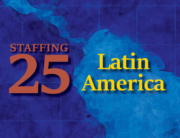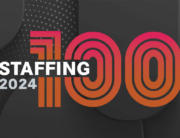Best-selling author, speaker and futurist Jacob Morgan’s mission is to help future-proof employees and their organizations. As such, he runs a Future of Work community; speaks at conferences; advises organizations; and creates blog posts, podcasts and videos that educate companies and employees, helping them to adapt to the changes in the world of work. His latest book, The Future of Work: Attract New Talent, Build Better Leaders, and Create a Competitive Organization, was published in September 2014. He will share his latest insights March 18 at the Executive Forum in Orlando. Editor and Publisher Subadhra R. Sriram talks with him about how the future of work is affecting the staffing industry.
Q: There is much debate and dialogue about the future of work. What is it all about?
Jacob Morgan: Work really hasn’t been challenged over the last hundred years. The way we have been thinking (and doing work) in the past two decades is pretty much the same way we are doing things today. The future of work is all about looking at all those practices, looking at all those strategies, looking at all those technologies that we can use and thinking how we can do things differently.
There are a lot of common ideas that we have about work. And one of the common ideas is that we have to work in an office. Another is we need to get approvals for things we buy. Yet another is managers make all the decisions and then distribute their orders to the rest of the employees. These are all very common assumptions we are starting to question.
You talk about the balance of power shifting away from the organization toward the employee, how does it play out?
Companies have always had the power to attract employees and that’s because they have the No. 1 asset that employees care about, which is cash. If you have a lot of money, you can bring in the best employees to your company. And that’s pretty much been the standard for most organizations since business has been created.
And now we are starting to shift away from that, where employees are valuing other things. In fact, there was a recent report that came from Boston Consulting Group where they surveyed more than 200,000 people. The No. 1 factor for employee happiness on the job was appreciation and No. 2 was a good relationship with colleagues. Salary was No. 8 on the list. What that means now is organizations can’t just use money, which is its biggest asset, to bring in the best employees. It means creating a corporate culture employees want to be a part of, it means providing a flexible work environment, it means exploring different types of ideas and experimenting.
A part of this is also because employees now have a lot of opportunities to make money. In the past, the only way you can make a living is to go work for somebody else. But today people are using Elance-oDesk, becoming freelancers and renting their services. We see people going on sites like Task- Rabbit, where they are helping with physical services. We see people driving cars for Uber and Lyft. People are renting their apartments on Airbnb. Lots of them are raising money on Indiegogo or Kickstarter. The pool of talent has never been greater. But to attract and retain the very best employees, you and I have to think differently about what it means to work in a company, and that’s what we are starting to see.
Do you see the economy adapting to a fully contingent model?
I don’t believe we will get to a point where 100% of the workforce can be completely contingent. I think that a lot of things will have to happen for that to take place. But we are moving in a direction of having more contingent workers. I think we are going to see two things happen. The first is that organizations are going to rely more on external contingent workers. So working with sites like Elance-oDesk or other staffing agencies, that’s one thing we are going to see. And the second thing we will see is organizations will create their own internal freelance marketplaces.
Imagine you are working for a company like Pepsi, Coke or IBM. What will happen there is, instead of you having a long-term career, you will work on a project for a couple of weeks or months. Once that project is over you will have the opportunity to seek other projects the company needs help with. And just like the freelance marketplace, you will be able to recommend yourself; you will be able to reach out and see if you will be a good fit. You stay within the organization, and you act like a free- lancer but you are still technically a part of that organization. I think we are going to see more of such internal market- places get built specially for larger organizations.
Where does the staffing industry fit in?
The staffing industry is at the right point for a change. There are lots of good things happening. Various reports show that organizations are going to be increasing the use of contingent workers. That’s fantastic because that means we can expect the industry to grow. But I think a part of that also means the industry needs to adapt to help organizations find talent and work with them.
The staffing industry is no longer about a company picking up the phone and calling an agency and saying, hey, I need 20 people who can do this. It’s no longer about walking into the office and having a whole conversation about it. It is accessing a marketplace and quickly being able to find the people and bring them in, maybe with 24 hours’ notice.
The industry needs to do whatever it can to make it easier for organizations to bring in these contingent workers and to look at the impact that these contingent workers are having and where they are (located) within the company. I think there is a lot of opportunity for some- thing like that.
Do you have any recommendations for the industry?
The first is to understand the five trends that are shaping the future of work. Globalization, millennials, technology, new behaviors that are shaping the work- place and mobility. Understanding those five trends and how they are having an impact on how works gets done, I think that’s crucial. The second thing I think staffing firms need to focus on is coming up with new technology solutions to make it easier for organizations to bring in a contingent workforce. It’s about how to access the marketplace, manage it and how to go about making that relation- ship as seamless as possible.
How do you get these organizations ready for the opportunities and challenges that lie ahead?
One of the biggest things the companies can do is to run experiments and test ideas. You come up with ideas you want to test. You want to experiment and test those ideas. I also think we need more formalized programs in place to under- stand what the future of work is going to look like — teams that are continuously exploring the future of work. We need some part of the company that is always interested and anticipates what the future of work looks like. Sometimes we can call them a transformative solutions team, sometimes they are the future of work teams. Regardless, these groups are continuously looking at how the world of work is changing.
Let’s talk about your book. What was your purpose when you wrote it?
Many people are talking about the future of work. It’s a very popular topic, as we know. A big challenge we also see around that is there are not really any concrete ideas or principles that are put into place to help companies understand what the future of work is going to look like.
That’s why I wanted to write a book. And I broke it down into specific principles on how the employees, managers and organizations of the future are going to look and how things are evolving and I wanted it to be something that is within the next five years or so. I also wanted to put something together that is more changeable in nature, it’s one thing to talk about the future of work, it’s another thing to actually lay out specific principles for companies to follow and show them how things are changing. It’s ultimately what I wanted to do. And I think the book does a very good job of that.







